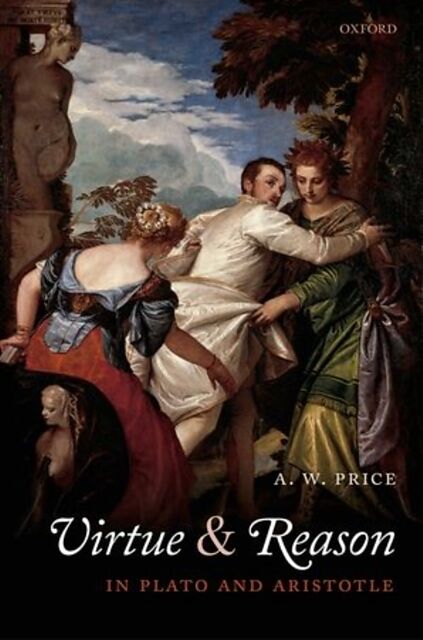Virtue and Reason in Plato and Aristotle
Einband:
Fester Einband
EAN:
9780199609611
Untertitel:
Englisch
Genre:
Philosophie & Religion
Autor:
A.W. Price
Herausgeber:
Oxford Academic
Anzahl Seiten:
370
Erscheinungsdatum:
20.10.2011
ISBN:
978-0-19-960961-1
Zusatztext VR is a closely argued and densely packed work which is likely to become an essential point of reference for certain research programmes in Platonic and Aristotelian ethics and moral psychology. Informationen zum Autor A. W. Price was educated at Winchester and Oxford, and has taught chiefly at York and in London. He has maintained an interest both in current ethical theory, and in the moral psychology of Greek philosophers, especially Plato and Aristotle. This is his fourth book. Klappentext A.W. Price explores the views of Plato and Aristotle on how virtue of character and practical reasoning enable agents to achieve eudaimonia the state of living or acting well. He provides a full philosophical analysis and argues that the perennial question of action within human life is central to the reflections of these ancient philosophers. Zusammenfassung In this authoritative discussion of the philosophy of Plato and Aristotle, A. W. Price considers four related areas: eudaimonia, or living and acting well, as the ultimate end of action; virtues of character in relation to the emotions, and to one another; practical reasoning, especially from an end to ways or means; and acrasia, or action that is contrary to the agent's own judgement of what is best. The focal concept is that of eudaimonia, which both Plato and Aristotle view as an abstract goal that is valuable enough to motivate action. Virtue has a double role to play in making its achievement possible, both in proposing subordinate ends apt to the context, and in protecting the agent against temptations to discard them too easily. For both purposes, Price suggests that virtues need to form a unity--but one that can be conceived in various ways. Among the tasks of deliberation is to work out how, and whether, to pursue some putative end in context. Aristotle returns to early Plato in finding it problematic that one should consciously sacrifice acting well to some incidental attraction; Plato later finds this possible by postulating schism within the soul. Price maintains that it is their emphasis upon the centrality of action within human life that makes the reflections of these ancient philosophers perennially relevant. Inhaltsverzeichnis INTRODUCTION PART A: EUDAIMONIA A1: PLATO ON EUDAIMONIA A2: ARISTOTLE ON EUDAIMONIA PART B: VIRTUE B1: PLATO ON VIRTUE B2: ARISTOTLE ON VIRTUE PART C: PRACTICAL REASONING C1: PLATO ON PRACTICAL REASONING C2: ARISTOTLE ON PRACTICAL REASONING PART D: ACRASIA D1: PLATO ON ACRASIA D2: ARISTOTLE ON ACRASIA REFERENCES INDEX ...
Autorentext
A. W. Price was educated at Winchester and Oxford, and has taught chiefly at York and in London. He has maintained an interest both in current ethical theory, and in the moral psychology of Greek philosophers, especially Plato and Aristotle. This is his fourth book.
Klappentext
A.W. Price explores the views of Plato and Aristotle on how virtue of character and practical reasoning enable agents to achieve eudaimonia the state of living or acting well. He provides a full philosophical analysis and argues that the perennial question of action within human life is central to the reflections of these ancient philosophers.
Zusammenfassung
In this authoritative discussion of the philosophy of Plato and Aristotle, A. W. Price considers four related areas: eudaimonia, or living and acting well, as the ultimate end of action; virtues of character in relation to the emotions, and to one another; practical reasoning, especially from an end to ways or means; and acrasia, or action that is contrary to the agent's own judgement of what is best. The focal concept is that of eudaimonia, which both Plato and Aristotle view as an abstract goal that is valuable enough to motivate action. Virtue has a double role to play in making its achievement possible, both in proposing subordinate ends apt to the context, and in protecting the agent against temptations to discard them too easily. For both purposes, Price suggests that virtues need to form a unity--but one that can be conceived in various ways. Among the tasks of deliberation is to work out how, and whether, to pursue some putative end in context. Aristotle returns to early Plato in finding it problematic that one should consciously sacrifice acting well to some incidental attraction; Plato later finds this possible by postulating schism within the soul. Price maintains that it is their emphasis upon the centrality of action within human life that makes the reflections of these ancient philosophers perennially relevant.
Inhalt
INTRODUCTION
PART A: EUDAIMONIA
A1: PLATO ON EUDAIMONIA
A2: ARISTOTLE ON EUDAIMONIA
PART B: VIRTUE
B1: PLATO ON VIRTUE
B2: ARISTOTLE ON VIRTUE
PART C: PRACTICAL REASONING
C1: PLATO ON PRACTICAL REASONING
C2: ARISTOTLE ON PRACTICAL REASONING
PART D: ACRASIA
D1: PLATO ON ACRASIA
D2: ARISTOTLE ON ACRASIA
REFERENCES
INDEX

Leider konnten wir für diesen Artikel keine Preise ermitteln ...
billigbuch.ch sucht jetzt für Sie die besten Angebote ...
Die aktuellen Verkaufspreise von 6 Onlineshops werden in Realtime abgefragt.
Sie können das gewünschte Produkt anschliessend direkt beim Anbieter Ihrer Wahl bestellen.
Loading...
Die aktuellen Verkaufspreise von 6 Onlineshops werden in Realtime abgefragt.
Sie können das gewünschte Produkt anschliessend direkt beim Anbieter Ihrer Wahl bestellen.
| # | Onlineshop | Preis CHF | Versand CHF | Total CHF | ||
|---|---|---|---|---|---|---|
| 1 | Seller | 0.00 | 0.00 | 0.00 |
